|
Recent Addition, November-December 2017 |
|
- Home > Recent Addition, November-December 2017
|

Recent Addition, November-December 2017| 1. Losing an empire, finding a role: British foreign policy since 1945 / by Sanders, David -- 2nd Ed. 2017 | 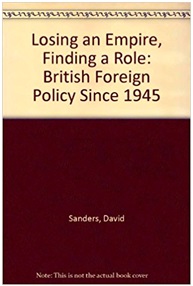 Abstract: This book provide a reliable and comprehensive introduction to the evolution of British external policy, including economic and defence policy, in the postwar period. Characterized by its accessible style and depth of analysis, and now fully updated in line with twenty-first century developments, Losing an Empire, Finding a Role will remain an invaluable guide to British foreign policy for students of international relations or foreign policy at any level. Abstract: This book provide a reliable and comprehensive introduction to the evolution of British external policy, including economic and defence policy, in the postwar period. Characterized by its accessible style and depth of analysis, and now fully updated in line with twenty-first century developments, Losing an Empire, Finding a Role will remain an invaluable guide to British foreign policy for students of international relations or foreign policy at any level. | | 2. Myanmar's enemy within: buddhist violence and the making of a muslim 'other'(Asian Arguments) / by Wade, Francis. 2017 |  Abstract: For decades Myanmar has been portrayed as a case of good citizen versus bad regime - men in jackboots maintaining a suffocating rule over a majority Buddhist population beholden to the ideals of non-violence and tolerance. But in recent years this narrative has been upended. In June 2012, violence between Buddhists and Muslims in western Myanmar pointed to a growing divide between religious communities that before had received little attention from the outside world. Attacks on Muslims then spread across the country, leaving hundreds dead, entire neighbourhoods turned to rubble, and tens of thousands of Muslims confined to internment camps. The violence, spurred on by monks, pro-democracy activists and politicians-and erupting amid the passage to democracy-has illuminated a hard truth: that in diverse societies undergoing the pains of transition, communities once united in their opposition to ruling powers can turn on one another in the cruellest of ways. Abstract: For decades Myanmar has been portrayed as a case of good citizen versus bad regime - men in jackboots maintaining a suffocating rule over a majority Buddhist population beholden to the ideals of non-violence and tolerance. But in recent years this narrative has been upended. In June 2012, violence between Buddhists and Muslims in western Myanmar pointed to a growing divide between religious communities that before had received little attention from the outside world. Attacks on Muslims then spread across the country, leaving hundreds dead, entire neighbourhoods turned to rubble, and tens of thousands of Muslims confined to internment camps. The violence, spurred on by monks, pro-democracy activists and politicians-and erupting amid the passage to democracy-has illuminated a hard truth: that in diverse societies undergoing the pains of transition, communities once united in their opposition to ruling powers can turn on one another in the cruellest of ways. | | 3. Myanmar's integration with the world: challenges and policy options / by De, Prabir Ed. 2017 |  Abstract: This book comprehensively investigates the challenges to Myanmar’s access to the global market. Myanmar is a late entrant in the global trade and investment scenario after years of isolation. However, it has large untapped potentials for trade and investment in minerals, agro and forest based industries, other labour intensive industries, services like tourism, IT, etc. Different chapters of the book explore the implication of democratic transition of Myanmar, the progress of Myanmar’s industry and infrastructure, its international linkages and feasible options for integrating more in regional economic groups and also analyses how far Myanmar could exploit the global value chain. Although a number of reports have discussed sector specific prospects of Myanmar, this book is an authoritative work on these aspects for policy planners, academicians, researchers as well as potential investors. Abstract: This book comprehensively investigates the challenges to Myanmar’s access to the global market. Myanmar is a late entrant in the global trade and investment scenario after years of isolation. However, it has large untapped potentials for trade and investment in minerals, agro and forest based industries, other labour intensive industries, services like tourism, IT, etc. Different chapters of the book explore the implication of democratic transition of Myanmar, the progress of Myanmar’s industry and infrastructure, its international linkages and feasible options for integrating more in regional economic groups and also analyses how far Myanmar could exploit the global value chain. Although a number of reports have discussed sector specific prospects of Myanmar, this book is an authoritative work on these aspects for policy planners, academicians, researchers as well as potential investors. | | 4. China’s emerging cyber operations capablilities & implications for India / by Mehrotra, Rohit; USI, New Delhi. 2017 | 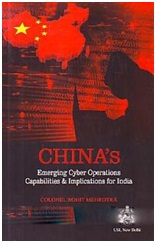 Abstract: China has declared ‘Outer Space and Cyber Space’ as the new commanding heights in strategic competition among all parties and is accelerating its evolution to informatization. The control of cyberspace is central to the PLA’s overarching goal of becoming a force that can ‘wen wars under informatized conditions’s as the newest element of its military strategy. Abstract: China has declared ‘Outer Space and Cyber Space’ as the new commanding heights in strategic competition among all parties and is accelerating its evolution to informatization. The control of cyberspace is central to the PLA’s overarching goal of becoming a force that can ‘wen wars under informatized conditions’s as the newest element of its military strategy. | | 5. The new silk road: China meets Europe in the Baltic sea region / Larcon, Jean Paul Ed. 2017 | 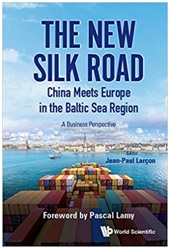 Abstract: This book focuses on the business and economic dimensions of China's initiative: Chinese government objective and policies, the strategies of Chinese and foreign firms along the Silk Road, trade and investment between China and Nordic-Baltic countries, the Eurasia Land Bridge corridors and logistics, the impact of the New Silk Road on the economies of Central Asia, new institutions financing the "Belt and Road", cross-cultural challenges and Sino-foreign joint ventures along the New Silk Road. The direct impact of China's initiative on economic sectors such as logistics services; the shipping, port management and maritime industry; construction and high-speed train; energy and engineering; and e-commerce, information technology and tourism will be assessed. Abstract: This book focuses on the business and economic dimensions of China's initiative: Chinese government objective and policies, the strategies of Chinese and foreign firms along the Silk Road, trade and investment between China and Nordic-Baltic countries, the Eurasia Land Bridge corridors and logistics, the impact of the New Silk Road on the economies of Central Asia, new institutions financing the "Belt and Road", cross-cultural challenges and Sino-foreign joint ventures along the New Silk Road. The direct impact of China's initiative on economic sectors such as logistics services; the shipping, port management and maritime industry; construction and high-speed train; energy and engineering; and e-commerce, information technology and tourism will be assessed. | | 6. Nexus of global Jihad: understanding cooperation among terrorist actors (Columbia Studies in Terrorism and Irregular Warfare) /by Moghadam, Assaf. 2017 |  Abstract: Leading jihadist groups such as al-Qaeda and the Islamic State dominate through cooperation in the form of knowledge sharing, resource sharing, joint training exercises, and operational collaboration. They build alliances and lesser partnerships with other formal and informal terrorist actors to recruit foreign fighters and spread their message worldwide, raising the aggregate threat level for their declared enemies. Whether they consist of friends or foes, whether they are connected locally or online, these networks create a wellspring of support for jihadist organizations that may fluctuate in strength or change in character but never runs dry. Nexus of Global Jihad identifies types of terrorist actors, the nature of their partnerships, and the environments in which they prosper to explain global jihadist terrorism's ongoing success and resilience.Nexus of Global Jihad brings to light an emerging style of "networked cooperation" that works alongside interorganizational terrorist cooperation to establish bonds of varying depth and endurance. Case studies use recently declassified materials to illuminate al-Qaeda's dealings from Iran to the Arabian Peninsula and the informal actors that power the Sharia4 movement. The book proposes policies that increase intelligence gathering on informal terrorist actors, constrain enabling environments, and disrupt terrorist networks according to different types of cooperation. It is a vital text for strategists and scholars struggling to understand a growing spectrum of terrorist groups working together more effectively than ever before. Abstract: Leading jihadist groups such as al-Qaeda and the Islamic State dominate through cooperation in the form of knowledge sharing, resource sharing, joint training exercises, and operational collaboration. They build alliances and lesser partnerships with other formal and informal terrorist actors to recruit foreign fighters and spread their message worldwide, raising the aggregate threat level for their declared enemies. Whether they consist of friends or foes, whether they are connected locally or online, these networks create a wellspring of support for jihadist organizations that may fluctuate in strength or change in character but never runs dry. Nexus of Global Jihad identifies types of terrorist actors, the nature of their partnerships, and the environments in which they prosper to explain global jihadist terrorism's ongoing success and resilience.Nexus of Global Jihad brings to light an emerging style of "networked cooperation" that works alongside interorganizational terrorist cooperation to establish bonds of varying depth and endurance. Case studies use recently declassified materials to illuminate al-Qaeda's dealings from Iran to the Arabian Peninsula and the informal actors that power the Sharia4 movement. The book proposes policies that increase intelligence gathering on informal terrorist actors, constrain enabling environments, and disrupt terrorist networks according to different types of cooperation. It is a vital text for strategists and scholars struggling to understand a growing spectrum of terrorist groups working together more effectively than ever before. | | 7. Nigeria's niger delta: militancy, amnesty, and the post amnesty environment/ by Abidde, Sabella Ogbobode. 2017 | 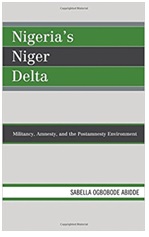 Abstract: This book examines the factors contributing to the Niger Delta crisis and explains why, in spite of the billions of dollars devoted to the presidential amnesty program, peace has eluded the region. It argues that the economic development of the region, and the fundamental restructuring of the country, is central to securing peace and for the prevention of the collapse of the state. Abstract: This book examines the factors contributing to the Niger Delta crisis and explains why, in spite of the billions of dollars devoted to the presidential amnesty program, peace has eluded the region. It argues that the economic development of the region, and the fundamental restructuring of the country, is central to securing peace and for the prevention of the collapse of the state. | | 8. Nordic states and European integration: awkward partners in the north? / by McCallion, Malin Stegmann Ed. 2018 |  Abstract: This book provides the first lengthy study of awkward states/partners in regional integration. Is awkwardness a characteristic of states in many global regions, or is it reducible to the particular case of the United Kingdom in European integration? The authors assess how far the concept of ‘awkwardness’ can travel, and apply it to the cases of the Nordic States’ involvement in and with the European Union - Denmark, Finland, Sweden, Iceland and Norway. The renewed interest in the Nordic region is in part thanks to recent events in the on-going crisis of European integration, and particular its member states’ response to the refugee question, which appears to be undermining years of intra-regional solidarity even between the Nordic countries. The security dimension of the region further broadens the book’s readership beyond Nordic Politics specialists to IR scholars, as the Nordic countries share borders with Russia and are key players in the Baltic Sea Strategy seeking to involve Russia in looser forms of regional cooperation. Abstract: This book provides the first lengthy study of awkward states/partners in regional integration. Is awkwardness a characteristic of states in many global regions, or is it reducible to the particular case of the United Kingdom in European integration? The authors assess how far the concept of ‘awkwardness’ can travel, and apply it to the cases of the Nordic States’ involvement in and with the European Union - Denmark, Finland, Sweden, Iceland and Norway. The renewed interest in the Nordic region is in part thanks to recent events in the on-going crisis of European integration, and particular its member states’ response to the refugee question, which appears to be undermining years of intra-regional solidarity even between the Nordic countries. The security dimension of the region further broadens the book’s readership beyond Nordic Politics specialists to IR scholars, as the Nordic countries share borders with Russia and are key players in the Baltic Sea Strategy seeking to involve Russia in looser forms of regional cooperation. | | 9. North Korea and nuclear weapons: entering the new era of deterrence /by Kim, Sung Chull. 2017 |  Abstract: North Korea is perilously close to developing strategic nuclear weapons capable of hitting the United States and its East Asian allies. Since their first nuclear test in 2006, North Korea has struggled to perfect the required delivery systems. Kim Jong-un's regime now appears to be close, however. Sung Chull Kim, Michael D. Cohen, and the volume contributors contend that the time to prevent North Korea from achieving this capability is virtually over; scholars and policymakers must turn their attention to how to deter a nuclear North Korea. The United States, South Korea, and Japan must also come to terms with the fact that North Korea will be able to deter them with its nuclear arsenal. How will the erratic Kim Jong-un behave when North Korea develops the capability to hit medium- and long-range targets with nuclear weapons? How will and should the United States, South Korea, Japan, and China respond, and what will this mean for regional stability in the short term and long term? The international group of authors in this volume address these questions and offer a timely analysis of the consequences of an operational North Korean nuclear capability for international security. Abstract: North Korea is perilously close to developing strategic nuclear weapons capable of hitting the United States and its East Asian allies. Since their first nuclear test in 2006, North Korea has struggled to perfect the required delivery systems. Kim Jong-un's regime now appears to be close, however. Sung Chull Kim, Michael D. Cohen, and the volume contributors contend that the time to prevent North Korea from achieving this capability is virtually over; scholars and policymakers must turn their attention to how to deter a nuclear North Korea. The United States, South Korea, and Japan must also come to terms with the fact that North Korea will be able to deter them with its nuclear arsenal. How will the erratic Kim Jong-un behave when North Korea develops the capability to hit medium- and long-range targets with nuclear weapons? How will and should the United States, South Korea, Japan, and China respond, and what will this mean for regional stability in the short term and long term? The international group of authors in this volume address these questions and offer a timely analysis of the consequences of an operational North Korean nuclear capability for international security. | | 10. The palgrave handbook of security, risk and intelligence /by Dover, Robert Ed. Edited by Robert Dover - UK: Palgrave Macmillan, 2017 |  Abstract: This handbook provides a detailed analysis of threats and risk in the international system and of how governments and their intelligence services must adapt and function in order to manage the evolving security environment. This environment, now and for the foreseeable future, is characterised by complexity. The development of disruptive digital technologies; the vulnerability of critical national infrastructure; asymmetric threats such as terrorism; the privatisation of national intelligence capabilities: all have far reaching implications for security and risk management. The leading academics and practitioners who have contributed to this handbook have all done so with the objective of cutting through the complexity, and providing insight on the most pressing security, intelligence, and risk factors today. They explore the changing nature of conflict and crises; interaction of the global with the local; the impact of technological; the proliferation of hostile ideologies and the challenge this poses to traditional models of intelligence; and the impact of all these factors on governance and ethical frameworks. The handbook is an invaluable resource for students and professionals concerned with contemporary security and how national intelligence must adapt to remain effective. Abstract: This handbook provides a detailed analysis of threats and risk in the international system and of how governments and their intelligence services must adapt and function in order to manage the evolving security environment. This environment, now and for the foreseeable future, is characterised by complexity. The development of disruptive digital technologies; the vulnerability of critical national infrastructure; asymmetric threats such as terrorism; the privatisation of national intelligence capabilities: all have far reaching implications for security and risk management. The leading academics and practitioners who have contributed to this handbook have all done so with the objective of cutting through the complexity, and providing insight on the most pressing security, intelligence, and risk factors today. They explore the changing nature of conflict and crises; interaction of the global with the local; the impact of technological; the proliferation of hostile ideologies and the challenge this poses to traditional models of intelligence; and the impact of all these factors on governance and ethical frameworks. The handbook is an invaluable resource for students and professionals concerned with contemporary security and how national intelligence must adapt to remain effective. | | 11. The Paris agreement on climate change: analysis and commentary /by Klein, Daniel Ed. 2017 | 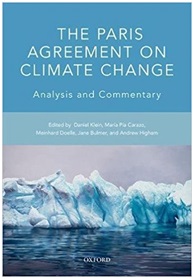 Abstract: The Paris Climate Agreement: Commentary and Analysis combines a comprehensive legal appraisal and critique of the new Agreement with a practical and structured commentary to all its Articles. Part I discusses the general context for the Paris Agreement, detailing the scientific, political, and social drivers behind it, providing an overview of the pre-existing regime, and tracking the history of the negotiations. It examines the evolution of key concepts such as common but differentiated responsibilities, and analyses the legal form of the Agreement and the nature of its provisions. Part II comprises individual chapters on each Article of the Agreement, with detailed commentary of the provisions which highlights central aspects from the negotiating history and the legal nature of the obligations. It describes the institutional arrangements and considerations for national implementation, providing practical advice and prospects for future development. Part III reflects on the Paris Agreement as a whole: its strengths and weaknesses, its potential for further development, and its relationship with other areas of public international law and governance. Abstract: The Paris Climate Agreement: Commentary and Analysis combines a comprehensive legal appraisal and critique of the new Agreement with a practical and structured commentary to all its Articles. Part I discusses the general context for the Paris Agreement, detailing the scientific, political, and social drivers behind it, providing an overview of the pre-existing regime, and tracking the history of the negotiations. It examines the evolution of key concepts such as common but differentiated responsibilities, and analyses the legal form of the Agreement and the nature of its provisions. Part II comprises individual chapters on each Article of the Agreement, with detailed commentary of the provisions which highlights central aspects from the negotiating history and the legal nature of the obligations. It describes the institutional arrangements and considerations for national implementation, providing practical advice and prospects for future development. Part III reflects on the Paris Agreement as a whole: its strengths and weaknesses, its potential for further development, and its relationship with other areas of public international law and governance. | | 12. Political Islam in Tunisia: the history of ennahda /by Wolf, Anne. 2017 | 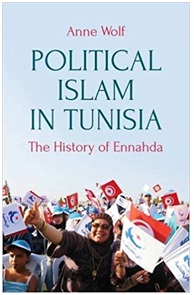 Abstract: Political Islam in Tunisia uncovers the secret history of Tunisia's main Islamist movement, Ennahda, from its origins in the 1960s to the present. Banned until the popular uprisings of 2010-11 and the overthrow of Ben Ali's dictatorship, Ennahda has until now been impossible to investigate. This is the first in-depth account of the movement, one of Tunisia's most influential political actors.Based on more than four years of field research, over 400 interviews, and access to private archives, Anne Wolf masterfully unveils the evolution of Ennahda's ideological and strategic orientations within changing political contexts and, at times, conflicting ambitions amongst its leading cadres. She also explores the challenges to Ennahda's quest for power from both secularists and Salafis. As the first full history of Ennahda, this book is a major contribution to the literature on Tunisia, Islamist movements, and political Islam in the Arab world. It will be indispensable reading for anyone seeking to understand the forces driving a key player in the country most hopeful of pursuing a democratic trajectory in the wake of the Arab Spring. Abstract: Political Islam in Tunisia uncovers the secret history of Tunisia's main Islamist movement, Ennahda, from its origins in the 1960s to the present. Banned until the popular uprisings of 2010-11 and the overthrow of Ben Ali's dictatorship, Ennahda has until now been impossible to investigate. This is the first in-depth account of the movement, one of Tunisia's most influential political actors.Based on more than four years of field research, over 400 interviews, and access to private archives, Anne Wolf masterfully unveils the evolution of Ennahda's ideological and strategic orientations within changing political contexts and, at times, conflicting ambitions amongst its leading cadres. She also explores the challenges to Ennahda's quest for power from both secularists and Salafis. As the first full history of Ennahda, this book is a major contribution to the literature on Tunisia, Islamist movements, and political Islam in the Arab world. It will be indispensable reading for anyone seeking to understand the forces driving a key player in the country most hopeful of pursuing a democratic trajectory in the wake of the Arab Spring. | | 13. Research handbook on UN sanctions and international law /by Herik, Larissa van de Ed. 2017 |  Abstract: The twenty-five years following the conclusion of the Cold War witnessed an unprecedented intensification of the usage of UN sanctions. This Research Handbook maps how UN sanctions multiplied and diversified during this period and analyses the substantive and procedural transformations to UN sanctions regimes, through the lens of international law. Expert contributors explore different types of UN sanctions regimes, most notably counter-terrorism regimes, counter-proliferation regimes and conflict-resolution regimes. They trace developments across these regimes, such as increased references to international legal standards in sanctions design and procedure as well as interplays with other processes and informal arrangements. Key chapters also specifically examine synergies between UN sanctions and unilateral measures and explore the different legal frameworks that shape and govern these respective regimes. Offering a holistic study of UN sanctions, this Research Handbook identifies cross-cutting issues and common challenges in order to provide an outlook on the future of UN sanctions in a 21st century setting. Comprehensive and engaging, students and scholars of international law and human rights law, as well as international relations more widely, will find this book an essential companion. Its forward-thinking approach will also benefit legal practitioners at the UN, other international organisations and law firms. Abstract: The twenty-five years following the conclusion of the Cold War witnessed an unprecedented intensification of the usage of UN sanctions. This Research Handbook maps how UN sanctions multiplied and diversified during this period and analyses the substantive and procedural transformations to UN sanctions regimes, through the lens of international law. Expert contributors explore different types of UN sanctions regimes, most notably counter-terrorism regimes, counter-proliferation regimes and conflict-resolution regimes. They trace developments across these regimes, such as increased references to international legal standards in sanctions design and procedure as well as interplays with other processes and informal arrangements. Key chapters also specifically examine synergies between UN sanctions and unilateral measures and explore the different legal frameworks that shape and govern these respective regimes. Offering a holistic study of UN sanctions, this Research Handbook identifies cross-cutting issues and common challenges in order to provide an outlook on the future of UN sanctions in a 21st century setting. Comprehensive and engaging, students and scholars of international law and human rights law, as well as international relations more widely, will find this book an essential companion. Its forward-thinking approach will also benefit legal practitioners at the UN, other international organisations and law firms. | | 14. Rising powers and global governance: changes and challenges for the world's nations / by Burki, Shahid Javed. 2017 | 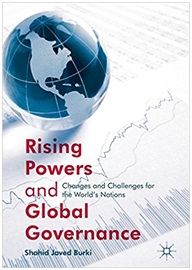 Abstract: This book reinforces the need to understand the sources of global change that is taking place and to accommodate it in the world political, social, and economic systems. Linking the United States, China, India, and Russia along with Europe and the Middle East, the author addresses demographics, international trade, technology, and climate change as global challenges that require cooperation in order to be solved. Both academics and policymakers will be enlightened, discovering ways of addressing global change by working together rather than through confrontation. Abstract: This book reinforces the need to understand the sources of global change that is taking place and to accommodate it in the world political, social, and economic systems. Linking the United States, China, India, and Russia along with Europe and the Middle East, the author addresses demographics, international trade, technology, and climate change as global challenges that require cooperation in order to be solved. Both academics and policymakers will be enlightened, discovering ways of addressing global change by working together rather than through confrontation. | | 15. The routledge handbook of Scandinavian politics /by Nedergaard, Peter Ed. 2018 |  Abstract: This is a comprehensive overview of Scandinavian politics provided by leading experts in the field and covering the polity, the politics and the policy of Scandinavia. Coherently structured with a multi-level thematic approach, it explains and details Scandinavian politics today through a series of cutting-edge chapters. It will be a key reference point both for advanced-level students developing knowledge about the subject, as well as researchers producing new material in the area and beyond. It brings geographical scope and depth, with comparative chapters contributed by experts across the region. Methodologically and theoretically pluralistic, the handbook is in itself a reflection of the field of political science in Scandinavia and the diversity of the issues covered in the volume. Abstract: This is a comprehensive overview of Scandinavian politics provided by leading experts in the field and covering the polity, the politics and the policy of Scandinavia. Coherently structured with a multi-level thematic approach, it explains and details Scandinavian politics today through a series of cutting-edge chapters. It will be a key reference point both for advanced-level students developing knowledge about the subject, as well as researchers producing new material in the area and beyond. It brings geographical scope and depth, with comparative chapters contributed by experts across the region. Methodologically and theoretically pluralistic, the handbook is in itself a reflection of the field of political science in Scandinavia and the diversity of the issues covered in the volume. | | 16. Russia's geoeconomic strategy for a greater Eurasia /by Diesen, Glenn. 2018 | 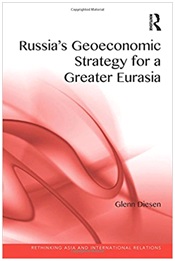 Abstract: Moscow has progressively replaced geopolitics with geoeconomics as power is recognised to derive from the state’s ability to establish a privileged position in strategic markets and transportation corridors. The objective is to bridge the vast Eurasian continent to reposition Russia from the periphery of Europe and Asia to the centre of a new constellation. Moscow’s ‘Greater Europe’ ambition of the previous decades produced a failed Western-centric foreign policy culminating in excessive dependence on the West. Instead of constructing Gorbachev’s ‘Common European Home’, the ‘leaning-to-one-side’ approach deprived Russia of the market value and leverage needed to negotiate a more favourable and inclusive Europe. Eurasian integration offers Russia the opportunity to address this ‘overreliance’ on the West by using the Russia’s position as a Eurasian state to advance its influence in Europe. Abstract: Moscow has progressively replaced geopolitics with geoeconomics as power is recognised to derive from the state’s ability to establish a privileged position in strategic markets and transportation corridors. The objective is to bridge the vast Eurasian continent to reposition Russia from the periphery of Europe and Asia to the centre of a new constellation. Moscow’s ‘Greater Europe’ ambition of the previous decades produced a failed Western-centric foreign policy culminating in excessive dependence on the West. Instead of constructing Gorbachev’s ‘Common European Home’, the ‘leaning-to-one-side’ approach deprived Russia of the market value and leverage needed to negotiate a more favourable and inclusive Europe. Eurasian integration offers Russia the opportunity to address this ‘overreliance’ on the West by using the Russia’s position as a Eurasian state to advance its influence in Europe. | | 17. Shaping peace in Kosovo: the political of peacebuilding and statehood /by Visoka, Gezim. 2017 |  Abstract: This book explores the prospects and limits of international intervention in building peace and creating a new state in an ethnically divided society and fragmented international order. The book offers a critical account of the international missions in Kosovo and traces the effectiveness of fluid forms of interventionism. It also explores the co-optation of peace by ethno-nationalist groups and explores how their contradictory perception of peace produced an ungovernable peace, which has been manifested with intractable ethnic antagonisms, state capture, and ignorance of the root causes, drivers, and consequences of the conflict. Under these conditions, prospects for emancipatory peace have not come from external actors, ethno-nationalist elite, and critical resistance movements, but from local and everyday acts of peace formation and agnostic forms for reconciliation. The book proposes an emancipatory agenda for peace in Kosovo embedded on post-ethnic politics and joint commitments to peace, a comprehensive agenda for reconciliation, people-centred security, and peace-enabling external assistance. Abstract: This book explores the prospects and limits of international intervention in building peace and creating a new state in an ethnically divided society and fragmented international order. The book offers a critical account of the international missions in Kosovo and traces the effectiveness of fluid forms of interventionism. It also explores the co-optation of peace by ethno-nationalist groups and explores how their contradictory perception of peace produced an ungovernable peace, which has been manifested with intractable ethnic antagonisms, state capture, and ignorance of the root causes, drivers, and consequences of the conflict. Under these conditions, prospects for emancipatory peace have not come from external actors, ethno-nationalist elite, and critical resistance movements, but from local and everyday acts of peace formation and agnostic forms for reconciliation. The book proposes an emancipatory agenda for peace in Kosovo embedded on post-ethnic politics and joint commitments to peace, a comprehensive agenda for reconciliation, people-centred security, and peace-enabling external assistance. | | 18. Socio-political order and security in the Arab world: from regime security to public security /by Krieg, Andreas. 2017 | 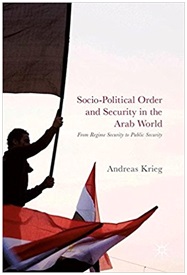 Abstract: This book examines the connection between socio-politics and security in the Arab World. In an effort to understand the social and political developments that have been on-going in the Arab World since the 1990s, culminating in the Arab Spring, Krieg moves beyond liberal deterministic assumptions - most notably that the promotion of liberal values and democracy are the panacea for the structural problems of the region. Instead, this text advances the case that grievances related to individual security needs are at the heart of regional insecurity and instability. Looking towards the future, the author asserts that regimes can only be resilient if they are able to provide for individual security inclusively. When regimes fail to cater for public security, they might be replaced by alternative non-state security providers. Abstract: This book examines the connection between socio-politics and security in the Arab World. In an effort to understand the social and political developments that have been on-going in the Arab World since the 1990s, culminating in the Arab Spring, Krieg moves beyond liberal deterministic assumptions - most notably that the promotion of liberal values and democracy are the panacea for the structural problems of the region. Instead, this text advances the case that grievances related to individual security needs are at the heart of regional insecurity and instability. Looking towards the future, the author asserts that regimes can only be resilient if they are able to provide for individual security inclusively. When regimes fail to cater for public security, they might be replaced by alternative non-state security providers. | | 19. Winning partnership India-UK relations beyond Brexit /by Manoj Ladwa. 2017 |  Abstract: India and its engagement with the world is being transformed like never before under the leadership like never before under the leadership of Prime Minister Narendra Modi. On the other hand, the UK, on of the most prosperous nations in the world, is going through tumultuous change following its epic decision to leave the European Union. Abstract: India and its engagement with the world is being transformed like never before under the leadership like never before under the leadership of Prime Minister Narendra Modi. On the other hand, the UK, on of the most prosperous nations in the world, is going through tumultuous change following its epic decision to leave the European Union. | | 20. South Korea's changing foreign policy: the impact of democratization and globalization /by Hwang, Wonjae.2017 | 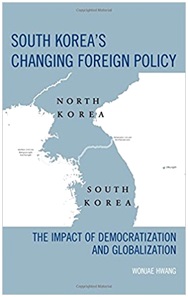 Abstract: South Korea has experienced new challenges both internally and externally with respect to its foreign policies. Internally, democratization has changed political terrain for domestic and international politics. Democratization and the information revolution have reinvigorated civic life and citizens have become active in expressing very divergent and often polarized views on foreign policies. Democratization also promotes South Korean nationalism. Rising nationalist sentiments make it difficult for the U.S. to effectively handle regional security-related issues such as the North Korean nuclear program, balancing against China, and dealing with the potential Sino-Japanese conflict. Externally, globalization has brought significant changes to South Korea's foreign policies. Economic dimension and issues rather than security-related issues become salient and important. For example, although security concerns are still dominant in Korean society, economic interests necessitate South Korea improve its relations with China and redefine its political position between the U.S. and China. Globalization has also promoted Korea's national interests to reach out to other countries. The Korean government has tried to develop new economic partnerships with developing countries for the purpose of securing energy and natural resources and expanding its soft power. Abstract: South Korea has experienced new challenges both internally and externally with respect to its foreign policies. Internally, democratization has changed political terrain for domestic and international politics. Democratization and the information revolution have reinvigorated civic life and citizens have become active in expressing very divergent and often polarized views on foreign policies. Democratization also promotes South Korean nationalism. Rising nationalist sentiments make it difficult for the U.S. to effectively handle regional security-related issues such as the North Korean nuclear program, balancing against China, and dealing with the potential Sino-Japanese conflict. Externally, globalization has brought significant changes to South Korea's foreign policies. Economic dimension and issues rather than security-related issues become salient and important. For example, although security concerns are still dominant in Korean society, economic interests necessitate South Korea improve its relations with China and redefine its political position between the U.S. and China. Globalization has also promoted Korea's national interests to reach out to other countries. The Korean government has tried to develop new economic partnerships with developing countries for the purpose of securing energy and natural resources and expanding its soft power. | | 21. Modern Conflict in the Greater Middle East: / by Tucker, Spencer C. 2017 |  Abstract: This reference work covers the history of Middle East nations, addressing military, political, diplomatic, and ideological trends in each respective country and enabling readers to better understand the factors behind the crises shaping the Middle East today.* Provides a detailed overview of Middle East conflicts since World War I in a single resource* Offers historical context for the level of involvement in various wars by Middle Eastern countries as well as each country's interaction with the West and other Middle East nations* Includes "Did You Know?" sidebars with interesting details, statistics, and other information related to the countries covered in the book Abstract: This reference work covers the history of Middle East nations, addressing military, political, diplomatic, and ideological trends in each respective country and enabling readers to better understand the factors behind the crises shaping the Middle East today.* Provides a detailed overview of Middle East conflicts since World War I in a single resource* Offers historical context for the level of involvement in various wars by Middle Eastern countries as well as each country's interaction with the West and other Middle East nations* Includes "Did You Know?" sidebars with interesting details, statistics, and other information related to the countries covered in the book | | 22. Taiwan's impact on China: why soft power matters more than economic or political inputs /by Tsang , Steve Ed. 2017 | 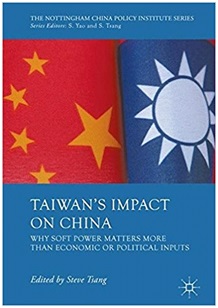 Abstract: This book is about the basis and scope of impact that Taiwan – a democracy with a population of around 23 million – has on China, the most powerful remaining Leninist state which claims sovereignty over Taiwan and has a population of over 1.3 billion. It examines how Taiwan has helped China in its economic transformation, but argues that the former exercises greatest influence through its soft power. The expert and timely contributions in this book demonstrate how Taiwan exerts real influence in China through admiration of its popular culture, be it in music or literature, as well as its reach into politics and economics. As mainland Chinese visit Taiwan, they are most impressed with civility in everyday living based on a modernized version of the traditional Chinese culture. However, discussions in the book also reveal the limits of Taiwan’s impact, as the Chinese government tightly controls the narrative about Taiwan and does not tolerate any Taiwanese posing a threat to its monopoly of power. Abstract: This book is about the basis and scope of impact that Taiwan – a democracy with a population of around 23 million – has on China, the most powerful remaining Leninist state which claims sovereignty over Taiwan and has a population of over 1.3 billion. It examines how Taiwan has helped China in its economic transformation, but argues that the former exercises greatest influence through its soft power. The expert and timely contributions in this book demonstrate how Taiwan exerts real influence in China through admiration of its popular culture, be it in music or literature, as well as its reach into politics and economics. As mainland Chinese visit Taiwan, they are most impressed with civility in everyday living based on a modernized version of the traditional Chinese culture. However, discussions in the book also reveal the limits of Taiwan’s impact, as the Chinese government tightly controls the narrative about Taiwan and does not tolerate any Taiwanese posing a threat to its monopoly of power. | | 23. The Us vs China: Asia's New Cold War? / by Woodward, Jude. 2017 | 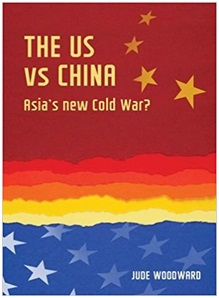 Abstract: This book addresses the most important question in geopolitics today - the future of relations between the US and China. Concerned that the rise of China will challenge the its hegemony in world affairs, the US has decided to reassert its influence in Asia to counteract any challenge. Examining and challenging the dominant causal explanations for and professed intentions of this shift in US policy, this book uncovers the real dynamics of contemporary Sino-American relations, surveying their complex interactions in the context of their post-war history, offering the reader an accessible and informative survey of the relations between China and the US in Asia, ranging from Russia's turn to the east, the rise of Japanese nationalism, democracy in Myanmar, North Korea's nuclear programme to disputes in the South China Sea. Abstract: This book addresses the most important question in geopolitics today - the future of relations between the US and China. Concerned that the rise of China will challenge the its hegemony in world affairs, the US has decided to reassert its influence in Asia to counteract any challenge. Examining and challenging the dominant causal explanations for and professed intentions of this shift in US policy, this book uncovers the real dynamics of contemporary Sino-American relations, surveying their complex interactions in the context of their post-war history, offering the reader an accessible and informative survey of the relations between China and the US in Asia, ranging from Russia's turn to the east, the rise of Japanese nationalism, democracy in Myanmar, North Korea's nuclear programme to disputes in the South China Sea. | | 24. Trump's populist America /by Rosefielde, Steven. 2017 |  Abstract: Donald Trump is America’s president because Washington chose to squeeze ordinary people for the establishment’s benefit. The common people in the spirit of Jeffersonian democracy rebelled voting to topple the establishment (Democrats and a majority of Republican leaders swayed by Strobe Talbott’s vision of the Global Nation and indebted to Wall Street) and replace it with an elected government that is attuned to the common man’s concerns. Ordinary Americans are not racists, bigots, xenophobes or isolationists. They are nationalists in the Jeffersonian sense who bristle at being victimized by over-reaching special interest government at home and who welcome amicable relations with neighbors across the globe. Abstract: Donald Trump is America’s president because Washington chose to squeeze ordinary people for the establishment’s benefit. The common people in the spirit of Jeffersonian democracy rebelled voting to topple the establishment (Democrats and a majority of Republican leaders swayed by Strobe Talbott’s vision of the Global Nation and indebted to Wall Street) and replace it with an elected government that is attuned to the common man’s concerns. Ordinary Americans are not racists, bigots, xenophobes or isolationists. They are nationalists in the Jeffersonian sense who bristle at being victimized by over-reaching special interest government at home and who welcome amicable relations with neighbors across the globe. | | 25. The Urgency of climate change: pivotal perspectives /by Magill, Gerard Ed. 2017 | 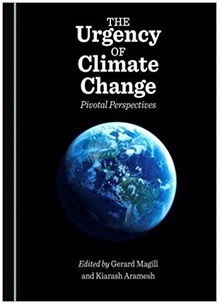 Abstract: The Urgency of Climate Change addresses a pivotal challenge for the sustainability of our planet. This topic was selected for the inaugural conference in 2015 of an annual series on the Integrity of Creation. The essays in this collection were selected in a peer-reviewed manner and appeal to a general audience. The chapters move from general to more specific points of view, with a discussion at the end of each section addressing the global impact of climate change. The first section sets the Context for the discussion, explaining that the climate is an indispensable common good. The part on Science emphasises that empirical reality must guide any analysis of the climate as a matter of basic knowledge and comprehension. A crucial implication is whether the climate is sufficiently robust for the Earth to flourish for millennia ahead, as discussed in the part on Sustainability. In turn, these sections raise pivotal questions, regarding Ethics about social obligations for the planet to flourish and regarding Religion to foster global stewardship. Finally, this alignment of Ethics and Religion around the problems related to Science and Sustainability leads to the final section on Law that considers policy possibilities to effectively engage Climate Change. Abstract: The Urgency of Climate Change addresses a pivotal challenge for the sustainability of our planet. This topic was selected for the inaugural conference in 2015 of an annual series on the Integrity of Creation. The essays in this collection were selected in a peer-reviewed manner and appeal to a general audience. The chapters move from general to more specific points of view, with a discussion at the end of each section addressing the global impact of climate change. The first section sets the Context for the discussion, explaining that the climate is an indispensable common good. The part on Science emphasises that empirical reality must guide any analysis of the climate as a matter of basic knowledge and comprehension. A crucial implication is whether the climate is sufficiently robust for the Earth to flourish for millennia ahead, as discussed in the part on Sustainability. In turn, these sections raise pivotal questions, regarding Ethics about social obligations for the planet to flourish and regarding Religion to foster global stewardship. Finally, this alignment of Ethics and Religion around the problems related to Science and Sustainability leads to the final section on Law that considers policy possibilities to effectively engage Climate Change. | | 26. US national cybersecurity: international politics, concepts and organization /by Puyvelde, Damien Van Ed. 2017 |  Abstract: This volume explores the contemporary challenges to US national cybersecurity. Taking stock of the field, it features contributions by leading experts working at the intersection between academia and government and offers a unique overview of some of the latest debates about national cybersecurity. These contributions showcase the diversity of approaches and issues shaping contemporary understandings of cybersecurity in the West, such as deterrence and governance, cyber intelligence and big data, international cooperation, and public–private collaboration. The volume’s main contribution lies in its effort to settle the field around three main themes exploring the international politics, concepts, and organization of contemporary cybersecurity from a US perspective. Related to these themes, this volume pinpoints three pressing challenges US decision makers and their allies currently face as they attempt to govern cyberspace: maintaining international order, solving conceptual puzzles to harness the modern information environment, and coordinating the efforts of diverse partners. Abstract: This volume explores the contemporary challenges to US national cybersecurity. Taking stock of the field, it features contributions by leading experts working at the intersection between academia and government and offers a unique overview of some of the latest debates about national cybersecurity. These contributions showcase the diversity of approaches and issues shaping contemporary understandings of cybersecurity in the West, such as deterrence and governance, cyber intelligence and big data, international cooperation, and public–private collaboration. The volume’s main contribution lies in its effort to settle the field around three main themes exploring the international politics, concepts, and organization of contemporary cybersecurity from a US perspective. Related to these themes, this volume pinpoints three pressing challenges US decision makers and their allies currently face as they attempt to govern cyberspace: maintaining international order, solving conceptual puzzles to harness the modern information environment, and coordinating the efforts of diverse partners. | | 27. Uyghur nation: reform and revolution on the Russia-China frontier (Hellenic Study Series) /by Brophy, David. 2016 |  Abstract: The meeting of the Russian and Qing empires in the nineteenth century had dramatic consequences for Central Asia's Muslim communities. Along this frontier, a new political space emerged, shaped by competing imperial and spiritual loyalties, cross-border economic and social ties, and the revolutions that engulfed Russia and China in the early twentieth century. David Brophy explores how a community of Central Asian Muslims responded to these historic changes by reinventing themselves as the modern Uyghur nation. A diverse diaspora of Muslims from China's northwest province of Xinjiang spread to Russian territory and became enmeshed with national and transnational discourses of identity among Russia's Muslims. In the tumult of the Bolshevik Revolution, the rhetoric of Uyghur nationhood emerged as a rallying point. A shifting alliance of constituencies invoked the idea of a Uyghur nation to secure a place for itself in Soviet Central Asia and to spread the revolution to Xinjiang. Although its existence was contested in the fractious politics of the 1920s, in the 1930s the Uyghur nation achieved official recognition in the Soviet Union and China. Grounded in archives from across Eurasia, Uyghur Nation provides crucial background to the ongoing contest for the history and identity of Xinjiang. Abstract: The meeting of the Russian and Qing empires in the nineteenth century had dramatic consequences for Central Asia's Muslim communities. Along this frontier, a new political space emerged, shaped by competing imperial and spiritual loyalties, cross-border economic and social ties, and the revolutions that engulfed Russia and China in the early twentieth century. David Brophy explores how a community of Central Asian Muslims responded to these historic changes by reinventing themselves as the modern Uyghur nation. A diverse diaspora of Muslims from China's northwest province of Xinjiang spread to Russian territory and became enmeshed with national and transnational discourses of identity among Russia's Muslims. In the tumult of the Bolshevik Revolution, the rhetoric of Uyghur nationhood emerged as a rallying point. A shifting alliance of constituencies invoked the idea of a Uyghur nation to secure a place for itself in Soviet Central Asia and to spread the revolution to Xinjiang. Although its existence was contested in the fractious politics of the 1920s, in the 1930s the Uyghur nation achieved official recognition in the Soviet Union and China. Grounded in archives from across Eurasia, Uyghur Nation provides crucial background to the ongoing contest for the history and identity of Xinjiang. | | 28. Waging insurgent warfare: lessons from the Vietcong to the Islamic state /by Jones, Set G. - USA: Oxford University Press. 2017 |  Abstract: While numerous books have been written on the subject of insurgencies, there is no book that brings together all of what we know into one accessible volume that policymakers can understand and use. Waging Insurgent Warfare is that book. Seth G. Jones, who has been deeply involved in the Afghanistan war over the last decade, aims to help policymakers, scholars, and general readers better understand how groups start, wage, and end insurgencies. He weaves together examples from today and from recent history into an analytic synthesis that focuses on several sets of questions. First, what factors contribute to the rise of an insurgency? Second, what are the key components involved in conducting an insurgency? As he explains, insurgent groups need to decide on a strategy, employ a range of tactics, select an organizational structure, secure outside aid from state and non-state actors, and conduct information campaigns. They then have to routinely re-assess these decisions over the course of an insurgency. Third, what factors contribute to the end of insurgencies? Finally, what do the answers to these questions mean for the conduct of counterinsurgency warfare? Waging Insurgent Warfare is not only a practical handbook for understanding insurgent warfare, but it also has implications for waging counterinsurgent warfare. Highly readable, empirically sophisticated, and historically informed, Waging Insurgent Warfare will become a standard work on the topic. Abstract: While numerous books have been written on the subject of insurgencies, there is no book that brings together all of what we know into one accessible volume that policymakers can understand and use. Waging Insurgent Warfare is that book. Seth G. Jones, who has been deeply involved in the Afghanistan war over the last decade, aims to help policymakers, scholars, and general readers better understand how groups start, wage, and end insurgencies. He weaves together examples from today and from recent history into an analytic synthesis that focuses on several sets of questions. First, what factors contribute to the rise of an insurgency? Second, what are the key components involved in conducting an insurgency? As he explains, insurgent groups need to decide on a strategy, employ a range of tactics, select an organizational structure, secure outside aid from state and non-state actors, and conduct information campaigns. They then have to routinely re-assess these decisions over the course of an insurgency. Third, what factors contribute to the end of insurgencies? Finally, what do the answers to these questions mean for the conduct of counterinsurgency warfare? Waging Insurgent Warfare is not only a practical handbook for understanding insurgent warfare, but it also has implications for waging counterinsurgent warfare. Highly readable, empirically sophisticated, and historically informed, Waging Insurgent Warfare will become a standard work on the topic. | | 29. War and peace in Africa's great lakes region /by Khadiagala, Gilbert M. Ed. 2017 |  Abstract: The book probes major security and governance trends in Africa’s Great Lakes region since the 1990s. It examines political dynamics in key states – Burundi, the DRC, Rwanda, and Uganda – as well as the role of international actors such as the AU, the EU, and the UN, thereby providing a unique perspective on efforts towards regional peace and prosperity. The authors suggest that while the region has made tremendous progress, it faces continuing challenges (including reversals in governance) that threaten future regional security. Abstract: The book probes major security and governance trends in Africa’s Great Lakes region since the 1990s. It examines political dynamics in key states – Burundi, the DRC, Rwanda, and Uganda – as well as the role of international actors such as the AU, the EU, and the UN, thereby providing a unique perspective on efforts towards regional peace and prosperity. The authors suggest that while the region has made tremendous progress, it faces continuing challenges (including reversals in governance) that threaten future regional security. | | 30. Yemen endures: civil war, Saudi adventurism and the future of Arabia / by Hill, Ginny. 2017 |  Abstract: Why is Saudi Arabia, the world's largest oil exporter, involved in a costly and merciless war against its mountainous southern neighbor Yemen, the poorest country in the Middle East? When the Saudis attacked the hitherto obscure Houthi militia, which they believed had Iranian backing, to oust Yemen's government in 2015, they expected an easy victory. They appealed for Western help and bought weapons worth billions of dollars from Britain and America; yet two years later the Houthis, a unique Shia sect, have the upper hand. In her revealing portrait of modern Yemen, Ginny Hill delves into its recent history, dominated by the enduring and pernicious influence of career dictator Ali Abdullah Saleh, who ruled for three decades before being forced out by street protests in 2011. Saleh masterminded patronage networks that kept the state weak, allowing conflict, social inequality and terrorism to flourish. In the chaos that follows his departure, civil war and regional interference plague the country while separatist groups, Al-Qaeda and ISIS compete to exploit the broken state. And yet, Yemen endures. Abstract: Why is Saudi Arabia, the world's largest oil exporter, involved in a costly and merciless war against its mountainous southern neighbor Yemen, the poorest country in the Middle East? When the Saudis attacked the hitherto obscure Houthi militia, which they believed had Iranian backing, to oust Yemen's government in 2015, they expected an easy victory. They appealed for Western help and bought weapons worth billions of dollars from Britain and America; yet two years later the Houthis, a unique Shia sect, have the upper hand. In her revealing portrait of modern Yemen, Ginny Hill delves into its recent history, dominated by the enduring and pernicious influence of career dictator Ali Abdullah Saleh, who ruled for three decades before being forced out by street protests in 2011. Saleh masterminded patronage networks that kept the state weak, allowing conflict, social inequality and terrorism to flourish. In the chaos that follows his departure, civil war and regional interference plague the country while separatist groups, Al-Qaeda and ISIS compete to exploit the broken state. And yet, Yemen endures. | | 31. Reconciliation and social healing in Afghanistan: a transrational and elicitive analysis towards transformation/ by Najibullah, Heela. 2017 | 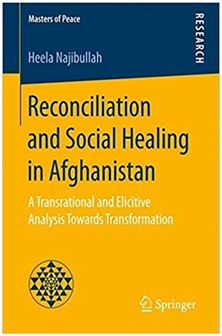 Abstract: The author analyzes the Afghan reconciliation processes through the lenses of transrational peace philosophy and Elicitive Conflict Transformation. The research highlights two Afghan governments reconciliation processes in 1986 and 2010 and underlines the political events that shaped the 1986 National Reconciliation Policy, drawing lessons for future processes. The author points out the historical and geopolitical patterns indicating regional and global stakeholders involvement in Afghan politics. Social healing through a middle-out approach is the missing and yet crucial component to achieve sustainable reconciliation in Afghanistan. Abstract: The author analyzes the Afghan reconciliation processes through the lenses of transrational peace philosophy and Elicitive Conflict Transformation. The research highlights two Afghan governments reconciliation processes in 1986 and 2010 and underlines the political events that shaped the 1986 National Reconciliation Policy, drawing lessons for future processes. The author points out the historical and geopolitical patterns indicating regional and global stakeholders involvement in Afghan politics. Social healing through a middle-out approach is the missing and yet crucial component to achieve sustainable reconciliation in Afghanistan. | | 32. Kashmir orphans, nurture and challenges / by Rao, Farman Ali. 2017 | 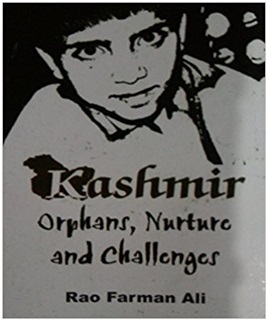 Absract: In, Jammu and Kashmir, the past twenty seven years of conflict resulted in an alarming increase in the number of orphans. As survey conducted by Kashmir based voluntary organization puts the figure at 0.015 million in the category of armed conflict, other sources put the figure approximately 0.10 million without any special catgorisation. Absract: In, Jammu and Kashmir, the past twenty seven years of conflict resulted in an alarming increase in the number of orphans. As survey conducted by Kashmir based voluntary organization puts the figure at 0.015 million in the category of armed conflict, other sources put the figure approximately 0.10 million without any special catgorisation. | | 33. The Crisis of the European Union: Challenges, Analyses, Solutions / by Grimmel, Anreas. 2017 | 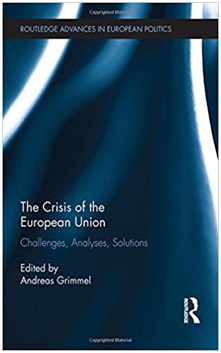 Abstract: This book addresses the major challenges confronting the EU, analyses the consequences for the integration project, and develops fresh perspectives on the EU’s future prospects for coping with the most debated, current and upcoming issues, such as the rise of Euroscepticism or the contested idea of an ‘ever-closer union’. Renowned experts in European Studies from the fields of political science, law, economics and sociology provide an interdisciplinary perspective on the different dimensions of the EU’s crisis-laden situation and question whether the EU’s existing problem-solving mechanisms and methods are sufficient to address the imminent tasks. Abstract: This book addresses the major challenges confronting the EU, analyses the consequences for the integration project, and develops fresh perspectives on the EU’s future prospects for coping with the most debated, current and upcoming issues, such as the rise of Euroscepticism or the contested idea of an ‘ever-closer union’. Renowned experts in European Studies from the fields of political science, law, economics and sociology provide an interdisciplinary perspective on the different dimensions of the EU’s crisis-laden situation and question whether the EU’s existing problem-solving mechanisms and methods are sufficient to address the imminent tasks. | | 34. Marching with a Billion: Analysing Narendra Modi’s Government at Midterm / by Mahurkar, Uday 2017 |  Abstract: The author analyses the Modi government's three years in power against the backdrop of years of policy paralysis and corruption before he came to power, leaving him with a stiff salvaging job. Focusing on key areas of governance like infrastructure, foreign affairs, power, the social sector, finance, digital technology and agriculture, the author showcases the work of the present government and the monumental changes the prime minister has brought about, including digital innovation and the uprooting of middlemen, which has resulted in an unprecedented level of transparency, and a resolute assault on poverty. He also points out some of the shortfalls of Modi's government, subjecting it to critical evaluation. Will Modi become a great institution builder, a prerequisite to becoming a nation builder? What will be the long-term impact of demonetization on the economy? Abstract: The author analyses the Modi government's three years in power against the backdrop of years of policy paralysis and corruption before he came to power, leaving him with a stiff salvaging job. Focusing on key areas of governance like infrastructure, foreign affairs, power, the social sector, finance, digital technology and agriculture, the author showcases the work of the present government and the monumental changes the prime minister has brought about, including digital innovation and the uprooting of middlemen, which has resulted in an unprecedented level of transparency, and a resolute assault on poverty. He also points out some of the shortfalls of Modi's government, subjecting it to critical evaluation. Will Modi become a great institution builder, a prerequisite to becoming a nation builder? What will be the long-term impact of demonetization on the economy? | | 35. Terrorism, Political Violence, and Extremism: New Psychology to Understand, Face, and Defuse the Threat by Stout, Chris E. 2017 |  Abstract: A must-read for psychologists-clinical and academic alike-as well as for political scientists, policy analysts, and others working in the realm of terrorism, political violence, and extremism, this book carefully explores the theories, observations, and approaches of authorities in the field and addresses how and why terrorism has perpetuated for so long.* Addresses how various groups are affected by terrorism, including children, older adults, and, arguably more relevant than ever before, refugees* Tackles the perplexing question of why terrorism has remained such a difficult problem to overcome* Includes contributions from Islamic subject matter expert, scholar, and author Dr. Sayed Ammar Nakshawani, listed among The 500 Most Influential Muslims* Serves as appropriate reading for students taking courses in subjects ranging from international psychology, military psychology and theory, political science, and political theory to religious studies, peace studies, military sciences, law enforcement, social work, feminist theory, public health, sociology, and anthropology Abstract: A must-read for psychologists-clinical and academic alike-as well as for political scientists, policy analysts, and others working in the realm of terrorism, political violence, and extremism, this book carefully explores the theories, observations, and approaches of authorities in the field and addresses how and why terrorism has perpetuated for so long.* Addresses how various groups are affected by terrorism, including children, older adults, and, arguably more relevant than ever before, refugees* Tackles the perplexing question of why terrorism has remained such a difficult problem to overcome* Includes contributions from Islamic subject matter expert, scholar, and author Dr. Sayed Ammar Nakshawani, listed among The 500 Most Influential Muslims* Serves as appropriate reading for students taking courses in subjects ranging from international psychology, military psychology and theory, political science, and political theory to religious studies, peace studies, military sciences, law enforcement, social work, feminist theory, public health, sociology, and anthropology | | 36. Terrorism Revisited: Islamism, Political Violence and State-Sponsorship / by Casaca, Paulo and Wolf, Siegfried O. 2017 | 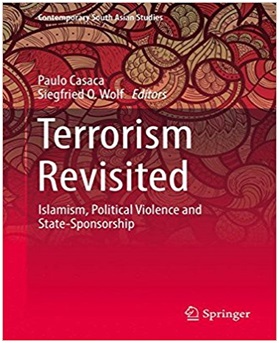 Abstrat: This book develops a conceptual approach to understanding the face of contemporary terrorism as manifested in the recent attacks in Mumbai and Paris. By analyzing the historical evolution of terrorism and by offering case studies on different forms of terrorism in South Asia and elsewhere, the authors shed new light on the political strategies behind terrorist attacks, as well as on the motivations of terrorists. The case studies explore the redefinition of terrorism by the Iranian Islamic revolution, the spread of terrorism in Sunni Islam, the national jihadism in Pakistan, anti-Semitism as a main factor behind fanatical terrorist ideologies, and the case of the Tamil Tigers Abstrat: This book develops a conceptual approach to understanding the face of contemporary terrorism as manifested in the recent attacks in Mumbai and Paris. By analyzing the historical evolution of terrorism and by offering case studies on different forms of terrorism in South Asia and elsewhere, the authors shed new light on the political strategies behind terrorist attacks, as well as on the motivations of terrorists. The case studies explore the redefinition of terrorism by the Iranian Islamic revolution, the spread of terrorism in Sunni Islam, the national jihadism in Pakistan, anti-Semitism as a main factor behind fanatical terrorist ideologies, and the case of the Tamil Tigers | | 37. Kashmir Imbroglio a septagon of indian bluffs pakistan blunders & treacheries of leadership/ by Gauhar, G N Maquiem Gauhar. 2017 | 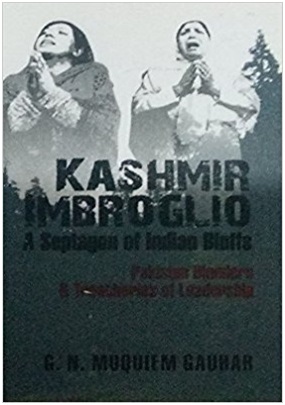 Abstract: Three wars were destructive consequences of Kashmir Imbroglio; continued hostilities fed malignancy of hatred in the sub-continent and the destruction of the nuclear war is being fed in the womb of the time. Abstract: Three wars were destructive consequences of Kashmir Imbroglio; continued hostilities fed malignancy of hatred in the sub-continent and the destruction of the nuclear war is being fed in the womb of the time. | | 38. Italy in International Relations: the foreign policy conundrum/ by Diodato, Emidio and Niglia, Federico. 2017 |  Abstract: This book aims to provide an overview of Italian foreign policy from the moment of unification to the establishment of the European Union. Three turning points are crucial in order to clarify Italy’s foreign policy: 1861, the proclamation of the Italian Kingdom; 1943, when Italy surrendered in World War II; 1992, the signing of the Maastricht Treaty. The international position of Italy continues to be an enigma for many observers and this fuels misinterpretations and prejudices. This book argues that Italy is different but not divergent from other European countries. Italian elites have traditionally seen foreign policy as an instrument to secure the state and import models for development. Italy can still contribute to international security and the strengthening of the EU. At the same time, Italy is not a pure adaptive country and has always maintained a critical attitude towards the international system in which it is incorporated. Abstract: This book aims to provide an overview of Italian foreign policy from the moment of unification to the establishment of the European Union. Three turning points are crucial in order to clarify Italy’s foreign policy: 1861, the proclamation of the Italian Kingdom; 1943, when Italy surrendered in World War II; 1992, the signing of the Maastricht Treaty. The international position of Italy continues to be an enigma for many observers and this fuels misinterpretations and prejudices. This book argues that Italy is different but not divergent from other European countries. Italian elites have traditionally seen foreign policy as an instrument to secure the state and import models for development. Italy can still contribute to international security and the strengthening of the EU. At the same time, Italy is not a pure adaptive country and has always maintained a critical attitude towards the international system in which it is incorporated. | | 39. India and Turkmenistan: cooperation for peace and development in the silk road region/ by Agnihotri, Mona and Mittal, Manu |  Abstract: India and Turkmenistan, regions of the fabled Silk Road form an extended neighborhood bound by common cultural, linguistic and historical destinies. In the century of a rising Asia, both India and Turkmenistan hold strategic ego-political significance. While India is a regional power with an increasing global influence, Turkmenistan is a key connector to Central Asia. Abstract: India and Turkmenistan, regions of the fabled Silk Road form an extended neighborhood bound by common cultural, linguistic and historical destinies. In the century of a rising Asia, both India and Turkmenistan hold strategic ego-political significance. While India is a regional power with an increasing global influence, Turkmenistan is a key connector to Central Asia. | | 40. A Military History of the Modern Middle East/ by McNabb, James Brian . 2017 | 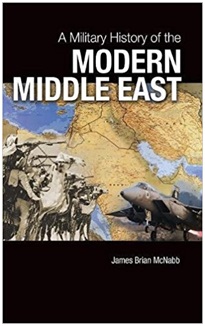 Abstract: This timely study synthesizes past history with the major military events and dynamics of the 20th- and 21st-century Middle East, helping readers understand the region's present-and look into its future.* Presents the evolution of combat and military thought in the region from ancient times into the contemporary era, summarizing the impact of the ancient and medieval worlds on the modern Middle East* Provides a synthesis of Middle Eastern politics, geo-strategy, and military operations* Discusses key religious and cultural dynamics that have driven events in the region* Focuses on pivotal moments as catalysts for change in the region* Examines the nexus between elite interests, factionalism, and the problem of development as it relates to conflict and military decision making. Abstract: This timely study synthesizes past history with the major military events and dynamics of the 20th- and 21st-century Middle East, helping readers understand the region's present-and look into its future.* Presents the evolution of combat and military thought in the region from ancient times into the contemporary era, summarizing the impact of the ancient and medieval worlds on the modern Middle East* Provides a synthesis of Middle Eastern politics, geo-strategy, and military operations* Discusses key religious and cultural dynamics that have driven events in the region* Focuses on pivotal moments as catalysts for change in the region* Examines the nexus between elite interests, factionalism, and the problem of development as it relates to conflict and military decision making. |
|
|
| |
|
|
|
|
|
|